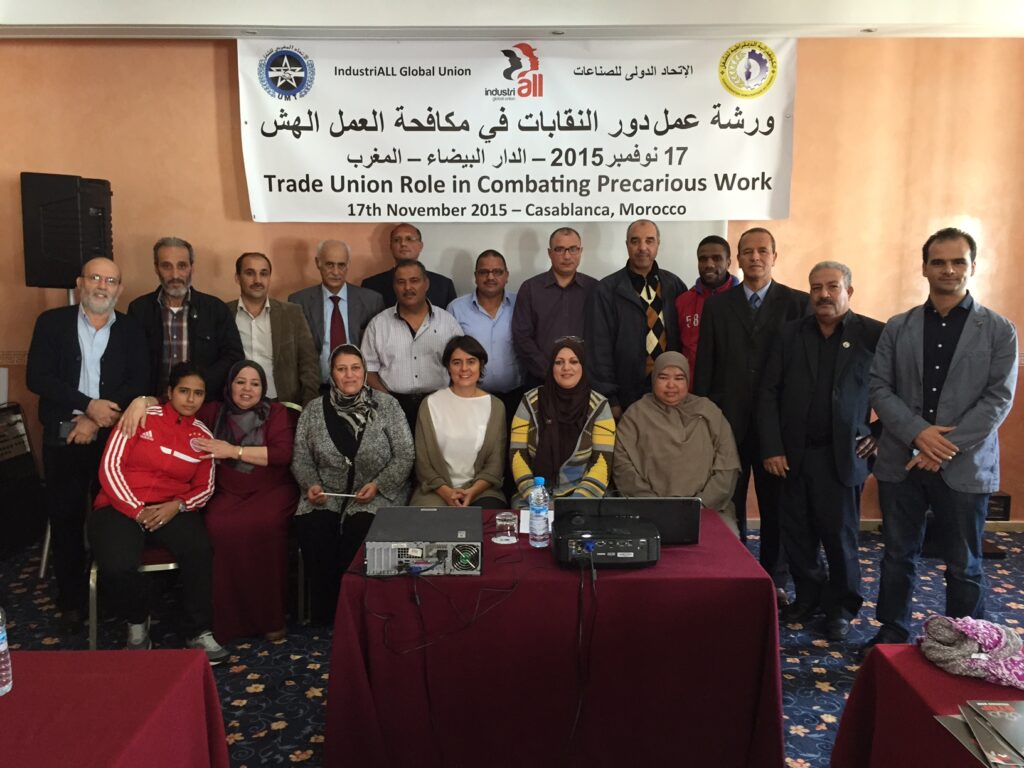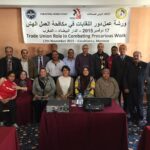27 November, 2015Despite protective legislation, precarious work is rapidly increasing in Morocco. IndustriALL‘s affiliates are fighting back, converting thousands of precarious workers into permanent workers.
There are no official figures on the number of fixed term contracts and temporary agency work in Morocco. However, trade unions in the country report an increase of these forms of employment. This is also confirmed by the Moroccan social security system, which indicates that the number of temporary workers benefiting from its coverage doubled between 2008 and 2013.
On 17 November, IndustriALL’s Moroccan affiliates met in Casablanca to discuss ways to coordinate the fight against precarious work. According to the existing labour code, temporary work should be an exception. But the abusive use of precarious work in the country is in clear violation of this, and the unions agreed on the need to collect data to be able to denounce the violations.
This meeting was also an opportunity for affiliates to exchange experiences with unions from Egypt and Tunisia who were present at the meeting, and who are also working to to stop precarious work.
IndustriALL Global Union’s affiliates in Morocco have taken action at company level to limit the use of precarious work and to convert temporary contracts into permanent ones.
Since 2010, in response of production’s increase in automotive sector in Morocco, auto companies and their suppliers based in Morocco, have employed hundreds of fixed-term contracts workers and resorted to temporary agency work.
The confederation UMT (Union Marocaine du Travail) reported that local staff representatives in an auto supplier managed through intensive collective bargaining, to progressively convert more than 500 fixed-term contract workers and agency workers into permanent workers. This has given the workers access to health insurance and bonuses, which they did not have before. As temporary workers, most of them was earning only minimum wage. The bargaining process is continuing, and the union is planning to convert an additional 220 temporary workers into permanent ones.
Between 2008 and 2014, the SNTP (Syndicat National des Travailleurs de Phosphate) affiliated to the CDT (Confédération Démocratique du Travail) reported that through successful collective bargaining, 2,400 outsourced workers were converted into permanent workers.
In a mine in Samine, belonging to the Managem group, the mining and energy union SNEM/CDT (Syndicat National d’Energie et des Mines) negotiated the conversion of 120 fixed-term contract workers who had had temporary workers status for years.
In the silver mine of Tinghir, also belonging to the Managem group, the same union succeeded through collective bargaining in 2001 to forbid outsourcing of any activities linked to production.
IndustriALL affiliates in Morocco have been able to develop alternative strategies to better protect precarious workers. The FNTE/UMT (Fédération Nationale de l’Energie) as well as the SNEM and the SNTP have ensured the inclusion, in the commercial contracts between the main employer and their subcontractors, provisions protecting the rights of subcontractors employees like the respect for freedom of association, respect for the labour code and health and safety standards, compulsory registration of workers in the social security system, as well as salaries at least at the level of the national minimum wage.
Unions at the meeting agreed that the fight against precarious work is continuing, and the issue will be discussed at the next meeting of the IndustriALL Moroccan council.
Kemal Özkan, assistant general secretary IndustriALL, says:
Despite the tireless efforts of employers to weaken the direct and permanent employment in Morocco, IndustriALL’s affiliates have been able to limit the expansion of precarious work in many companies through collective bargaining. This is a remarkable achievement.
However, this fight against precarious work is an uphill battle. We strongly support our affiliates' call for a better implementation of the existing legislation, restriciting the use of fixed-term contracts and agency work. We also welcome their willingness to further coordinate their future fight against precarious work.

